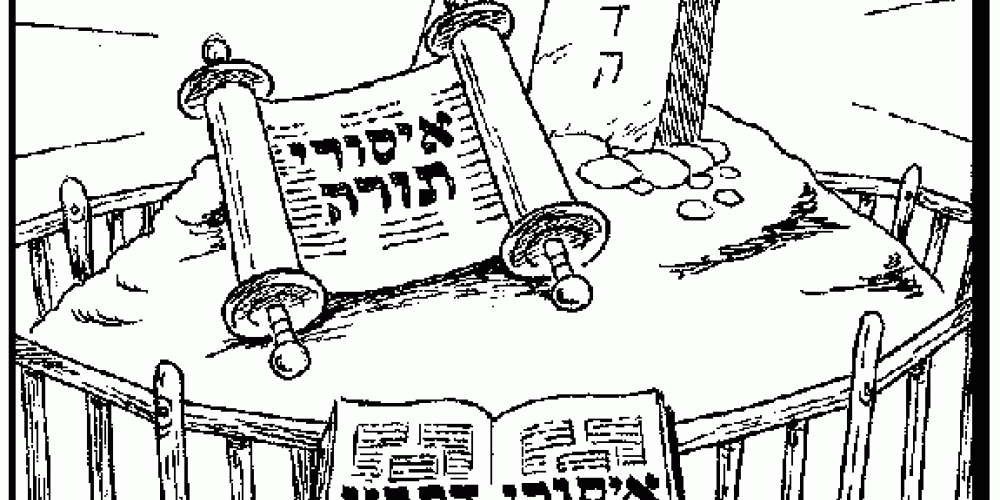
"Rav Elazar ben Yaakov said: I heard that the beit din may hit and punish not according to the [laws of the] Torah, not to violate the words of the Torah, but to make a fence around the Torah" (Yevamot 90b).
In our last post, we discussed on what basis the rabbis accepted the testimony of one witness that a man had died, thereby freeing his widow from the status of an agunah and allowing her to remarry. The Mishnah (Yevamot 87b) records a second law that also appears to go against the Torah. If it turns out the husband was not really dead, not only are any children from the second husband mamzerim, but any subsequent children she might have with her first husband--to whom she may not return--are also mamzerim (rabbinically). While we generally think of the declaration of mamzerut as a stringency--and it is--it does include a leniency, as a mamzer may marry other mamzerim[1].
The Mishnah thus serves as the basis for a detailed discussion of when the Rabbis may have the right to uproot laws of the Torah. We will highlight some of the discussion.
A key principle discussed is that of hefker beit din hefker, that the court has the right to declare property ownerless or perhaps even to transfer ownership from one person to another. This is similar (but not the same) to the concept of eminent domain, where governments have the right to expropriate private property for public use. This concept, the Gemara asserts, is rooted in Biblical law. As such, this principle explains why rabbinic amendments to the laws of inheritance do not necessarily demonstrate that the "rabbis have the power to uproot something from the Torah"--rather, they may be an application of hefker beit din hefker.
To cite one of many other examples of this principle, the Gemara (Pesachim 7a) rules that in the case of one who betroths a woman using chametz (as opposed to a ring) on erev Pesach in the sixth hour of the day, "there is no fear that they are betrothed". While chametz is only biblically forbidden at midday, the rabbis prohibited eating such two hours prior, and benefitting from chametz one hour prior to mid-day. So, even though, biblically speaking, this woman should be married, the principle of hefker beit din hefker declares the chametz ownerless and worthless. Hence, nothing of value was transferred to the woman, who remains single.
Probably the best-known examples of the Rabbis' "uprooting laws of the Torah" is when Rosh Hashanah and hence, the first day of Sukkot fall on Shabbat. While the Torah obligates blowing the shofar both on Shabbat and on weekdays, the rabbis forbade the blowing of shofar on Shabbat in keeping with the dictum of Rava that "all are obligated in the blowing of the shofar but not all are expert in such, a decree lest one will take it in his hand to learn and he will carry four cubits in a public domain, and such is the reason [we do not take] a lulav [on Shabbat], and such is the reason [we do not read] the Megillah [on Shabbat]" (Rosh Hashanah 29b). The Gemara explains that such is allowed, as "sit and do not do is different". It is one thing to passively tell people not to do a mitzvah, but it is altogether different to allow one to actively violate a law of the Torah.
While shofar and lulav are the most famous examples of this principle (the way our calendar is set up, the 14th of Adar never falls on Shabbat, though the 15th does), it is invoked in a number of other cases. One interesting example is the case of one who converts on erev Pesach - a most appropriate (if busy) day for such. Beit Hillel, in disagreeing with Beit Shammai, rules that this convert may not eat of the korban pesach lest he become tameh, impure, next year and not realize that as a Jew, he must wait seven days before going to mikvah. Such was not true in the previous year, as the laws of impurity do not apply to a non-Jew, allowing for immediate purity after conversion even if the "non-Jew" had just come in contact with a dead body[1].
The Gemara does give one set of circumstances that allow the rabbis to uproot the laws of the Torah even in an active fashion. "Eilav tishmaun, to him [the prophet] you shall listen (Devarim 18:15), even if he tells you to violate one of the laws of the Torah; for example, Eliyahu on Mount Carmel; everything according to the hour [needs of the time], you shall listen to him" (Yevamot 90b). Eliyahu violated a fundamental law of the Torah, one punishable with karet, excision, by offering sacrifices outside the Mishkan; but such was necessary "to repair the breach", in this case, to demonstrate to the Jewish people the futility of idol worship.
And hence, a Jewish court may--if the need is great--"hit and punish not according the [laws of] the Torah". At times, the courts must be very strict - the example given by the Gemara in applying this principle is giving the death penalty to one "who rode a horse on Shabbat during the time of the Greeks...not because he was deserving of such [a harsh punishment], but the time required it".
But at times we must be lenient--not necessarily by uprooting the laws of the Torah, but by reexamining halachic assumptions in light of changing realities[3]. In 1851, Rav Yaakov Ettlinger (Binyan Tzion Hachadashot, 23), in a groundbreaking responsum, suggested that we relax our harsh attitudes to Shabbat violators of "today". No longer did Shabbat violators reject Judaism, as many Jews have demonstrated much gray; violating many laws but deeply committed to others. More recently, the Chazon Ish ruled that non-observance of today is often a result of society at large, and even those brought up in religious homes who leave a life of observance are to be embraced, with the Talmudic strictures against sinners being no longer applicable.
While the goal of maximizing Jewish observance remains the same, the methods of doing such are subject to great change.
______________________________________________________
[1] The Gemara cites views that in fact, such a child is given only the stringencies of being a mamzer and would only be allowed to marry another rabbinically declared mamzer. If such is the case, this would not be a case of uprooting a law of the Torah.
[2] One can infer from here that one could convert despite being ignorant of what in Temple times would have been some of the basic laws of day-to-day life.
[3] Modern-day authorities have not shied away from "uprooting" the Torah where necessary. For example, Rav Moshe Feinstein (Yoreh Deah 2, #116) invoked the verse, "a time has come to do for G-d, they have nullified your Torah" in explaining why one may receive money for studying Torah even if such violates a clear ruling of the Rambam. I thank Rabbi Jonathan Ziring for pointing out this source.



